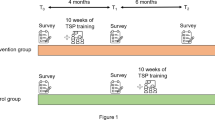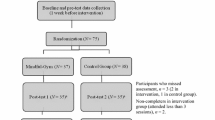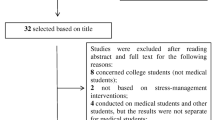Abstract
Approximately 10 % of first year medical students have clinically relevant anxiety or depression which may affect academic success and quality of life. This study tested the effects of a stress management intervention on indicators of anxiety, depression and self-efficacy in self-selected first year medical students. Forty two medical students volunteered to participate and provided informed consent. An eight session intervention was offered and focused on building relaxation skills, adaptive coping, and basic nutrition. Anxiety, depression, and self-efficacy were assessed pre and post intervention. This group of students had significantly higher baseline values of depression and anxiety but lower self-efficacy compared to a previous study of medical students at the same institution (p < 0.03). After the intervention, statistically significant improvements were observed in anxiety (p < 0.05), and self-efficacy (p < 0.05), but not in depression. The entering levels of anxiety and depression in this group suggested that these students were at risk for later clinical syndromes. Intervention directed to decreasing the effects of stress was associated with improvement in indicators of distress and may modify the longer term risk.
Similar content being viewed by others
References
Ajzen, I. (2002). Perceived behavioral control, self-efficacy, locus of control, and the theory of planned behavior. Journal of Applied Social Psychology, 32(4), 665–683.
Beck, A. T. (1990). Beck anxiety inventory. San Antonio, TX: Psychological Corporation.
Beck, A. T., Steer, R. A., & Brown, G. K. (2001). Beck depression inventory II. San Antonio, TX: Psychological Corporation.
Brazeau, C., Shanafelt, T., Durning, S., Massie, S., Eacker, A., Moutier, C., et al. (2014). Distress among matriculating medical students relative to the general population. Academic Medicine, 89(11), 1520–1525.
Brennan, J., McGrady, A., Lynch, D., & Whearty, K. (2010). Stress management intervention for first year medical students. Annals of Behavioral Science and Medical Education, 16(2), 15–19.
Carmody, D. P. (2005). Psychometric characteristics of the Beck depression inventory-II with college students of diverse ethnicity. International Journal of Psychiatry in Clinical Practice, 9(22), 22–28.
Chesney, M., Neilands, T., Chambers, D., Taylor, J., & Folkman, S. (2006). A validity and reliability study of the coping self-efficacy scale. British Journal of Health Psychology, 11(3), 421–437.
Dahlbeck, D., & Lightsey, O, Jr. (2008). Generalized self-efficacy, coping, and self-esteem as predictors of psychological adjustment among children with disabilities or chronic illnesses. Children’s Health Care, 37, 293–315.
Davis, M., Eschelman, E. R., & McKay, M. (2008). The relaxation and stress reduction workbook (6th ed.). Oakland, CA: New Harbinger Publication Inc.
Dyrbye, L., Harper, W., Durning, S. J., Moutier, C., Thomas, M. R., Massie, F. S, Jr, et al. (2013). Patterns of distress in US medical students. Medical Teacher, 33(10), 834–839.
Dyrbye, L. N., Harper, W., Moutier, C., Durning, S. J., Power, D. V., Masie, F. S., et al. (2012). A multi-institutional study exploring the impact of positive mental health on medical students’ professionalism in an era of high burnout. Academic Medicine, 87, 1024–1031.
Greeson, J., Toohey, M., & Pearce, M. (2015). An adapted, four-week mind-body skills group for medical students: Reducing stress, increasing mindfulness, and enhancing self-care. Explore, 11(3), 186–192.
Hobson, C. J., Kamen, J., Szostek, J., Nethercut, C. M., Tiedman, J. W., et al. (1998). Stressful life events: A revision and update of the social readjustment rating scale. International Journal of Stress Management, 5(1), 1–23.
Kotter, T., Pohontsch, N., & Voltmer, E. (2015). Stressors and starting points for health-promoting interventions in medical school from the students’ perspective: A qualitative study. Perspectives on Medical Education, 4, 128–135.
McGrady, A., Brennan, J., Lynch, D., & Whearty, K. (2012). A wellness program for first year medical students. Applied Psychophysiology and Biofeedback, 37, 253–260.
Schwarzer, R., & Renner, B. (2000). Social-cognitive predictors of health behavior: Action self-efficacy and coping self-efficacy. Health Psychology, 19(5), 487–495.
Slavin, S., Schindler, D., & Chibnall, J. (2014). Medical student mental health 3.0: Improving student wellness through curricular changes. Academic Medicine, 89(4), 573–577.
Sotile, W. M., & Sotile, M. O. (2002). The resilient physician. Chicago, IL: American Medical Association.
Acknowledgments
This study (Wellness Initiative for Future Health Care Providers) was supported by a grant from the David and Lura Lovell Foundation, Tucson, Arizona.
Author information
Authors and Affiliations
Corresponding author
Rights and permissions
About this article
Cite this article
Brennan, J., McGrady, A., Lynch, D.J. et al. A Stress Management Program for Higher Risk Medical Students: Preliminary Findings. Appl Psychophysiol Biofeedback 41, 301–305 (2016). https://doi.org/10.1007/s10484-016-9333-1
Published:
Issue Date:
DOI: https://doi.org/10.1007/s10484-016-9333-1




